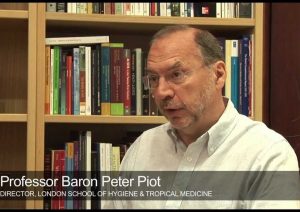If there is anyone from whose mouth an answer to the big question of HIV/AIDS pandemic should be heard, that voice must be Prof Peter Piot, currently the Director of the London School of Hygiene and Tropical Medicine. So, when he speaks at the Institute of Development Studies at the University of Sussex in the UK next week, is he making any categorical pronouncement on where the world is with one of humanity’s worst miseries?
 The world seems to be agog for Piot’s appearance at Sussex. As far as a categorical pronouncement is concerned, that is very unlikely to be what Piot would be bringing. The title of his presentation suggests that he is coming to widen the road map for an exit from the HIV-AIDS scourge. IDS is saying in a prefatory statement that, drawing on his more than 25 years of experience working on HIV/AIDS, Professor Peter Piot will discuss the interrelated relationship between HIV/AIDS and development, arguing that renewed efforts are needed to address the social, political, and economic drivers of HIV and vulnerability. “He will call for reinvigorated efforts to expand HIV prevention just as we saw with the unprecedented global scale-up of treatment, while maintaining that AIDS is a long-term challenge facing society that requires a development approach to address”.
The world seems to be agog for Piot’s appearance at Sussex. As far as a categorical pronouncement is concerned, that is very unlikely to be what Piot would be bringing. The title of his presentation suggests that he is coming to widen the road map for an exit from the HIV-AIDS scourge. IDS is saying in a prefatory statement that, drawing on his more than 25 years of experience working on HIV/AIDS, Professor Peter Piot will discuss the interrelated relationship between HIV/AIDS and development, arguing that renewed efforts are needed to address the social, political, and economic drivers of HIV and vulnerability. “He will call for reinvigorated efforts to expand HIV prevention just as we saw with the unprecedented global scale-up of treatment, while maintaining that AIDS is a long-term challenge facing society that requires a development approach to address”.
 The fears seems to lie in how elusive the end of the epidemic remains based on the nearly two million people newly infected with HIV in 2016 and one million AIDS-related deaths in the same year that IDS knows to be the case. It is, therefore, connecting this to the possibility of a resurgence of the epidemic, particularly in the context of what it calls the world’s largest-ever generation of young people, diminishing funds and weakening global resolve. This would contrast with remarkable progress said to have been made in the HIV/AIDS response in many countries as a result of widespread mobilisation and improved access to affordable antiretroviral therapy. It was the said progress that which inspired global calls to end the AIDS epidemic by 2030.
The fears seems to lie in how elusive the end of the epidemic remains based on the nearly two million people newly infected with HIV in 2016 and one million AIDS-related deaths in the same year that IDS knows to be the case. It is, therefore, connecting this to the possibility of a resurgence of the epidemic, particularly in the context of what it calls the world’s largest-ever generation of young people, diminishing funds and weakening global resolve. This would contrast with remarkable progress said to have been made in the HIV/AIDS response in many countries as a result of widespread mobilisation and improved access to affordable antiretroviral therapy. It was the said progress that which inspired global calls to end the AIDS epidemic by 2030.
Either way, it would be worth everyone’s while to listen to one of the world’s most determined fellows in terms of securing humanity from viruses. He has a huge presence in global governance, having institutionalized the fight against HIV as a cross-cutting challenge. That is UNAIDS of which he was the founding Executive Director and Under Secretary-General of the United Nations ,1995-2008. UNAIDS and fighting HIV-AIDS has been the most successful global governance success story in recent years, uniting local power structures, INGOs, global personalities, funders and state powers in the search for solution. That success has been a bit incomprehensible to many observers, given that Global Health Governance lacks a bureaucratic architecture that international security or the climate change process has. That’s the origin of the rhetorical poser: where is the house that WHO built?, WHO being the World Health Organisation.




























